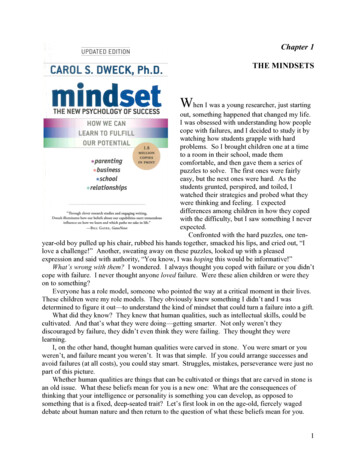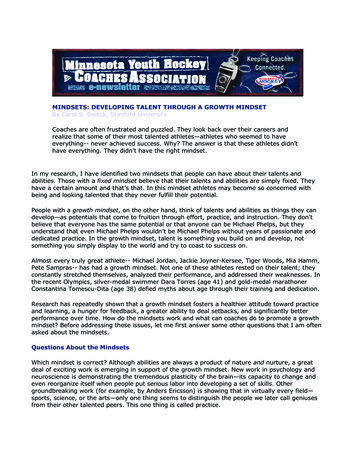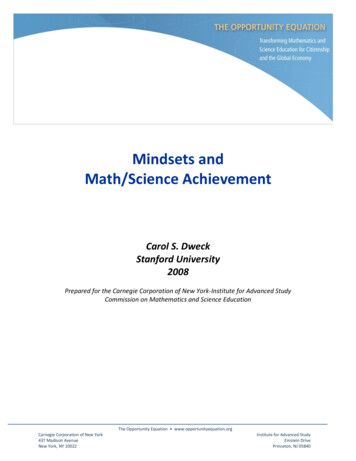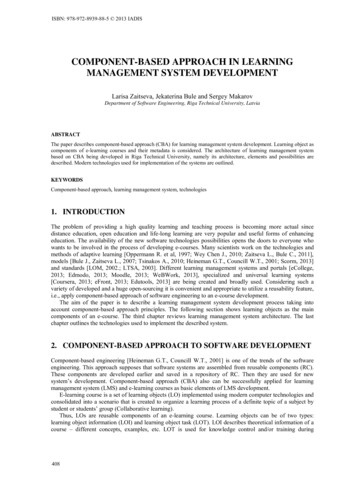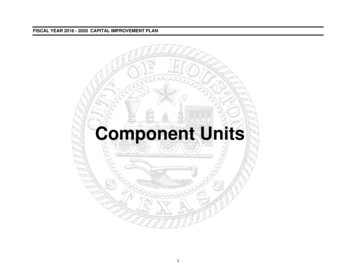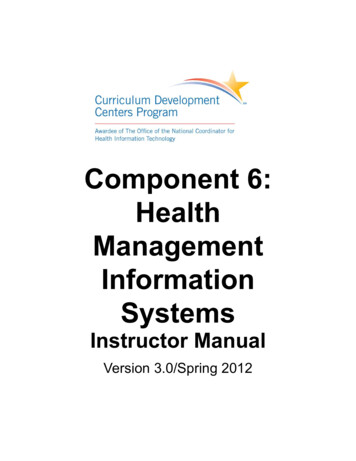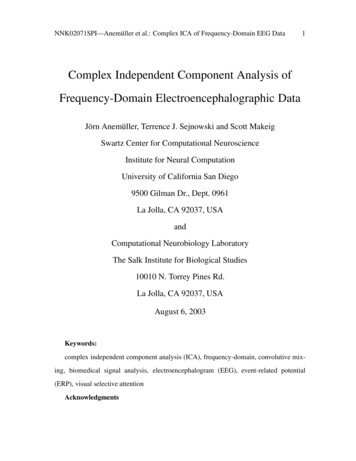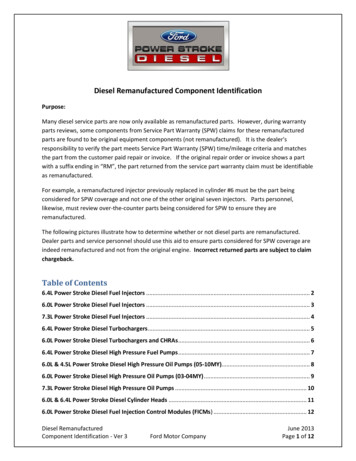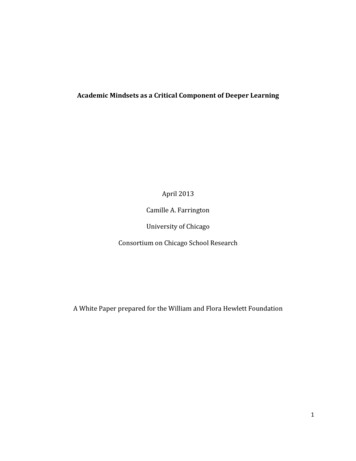
Transcription
Academic Mindsets as a Critical Component of Deeper LearningApril 2013Camille A. FarringtonUniversity of ChicagoConsortium on Chicago School ResearchA White Paper prepared for the William and Flora Hewlett Foundation1
The William and Flora Hewlett Foundation’s Deeper Learning FrameworkIn 2010, the William and Flora Hewlett Foundation’s Education Program announced itsstrategic focus centered on “deeper learning.” The Foundation’s Board of Directors hasmade clear its commitment to supporting an approach to K-12 and community collegeeducation in the United States to prepare students for a rapidly changing world, with theultimate goal of increasing economic opportunity and civic engagement, particularly forchildren and youth in high-poverty communities. According to the Education Program’sstrategic plan, reaching this goal requires “improving what students learn, how they learnit, and how they demonstrate their knowledge.”1 The Foundation asserts that Americanpublic schools must significantly “shift course” in their approach to teaching, learning, andassessment to ensure that students develop the skills, knowledge, and competencies theywill need to meet the quickly evolving demands of life, work, and global citizenship in the21st century. The Hewlett Foundation set its strategic priorities to promote these shifts inschooling practices – to “provide all students with access to rigorous, relevant, andinnovative educational opportunities”2 – so that every young person in the United Stateswould graduate from high school well-prepared to actively engage in the world.To meet its ambitious goals and guide funding in this area, the Hewlett Foundationdeveloped a framework articulating the components of deeper learning, drawing oncurrent research and expert opinion by commissioning research briefs and interviewingleading thinkers in education, business, and public policy. The deeper learning frameworkidentifies key content knowledge, academic skills, and learning competencies that shouldbe the products of any child’s K-16 education. The original framework included fivecomponents:-master core academic content throughcritical thinking and complex problem solving,working collaborativelycommunicating effectively, andlearning how to learn.Students who developed these competencies over the course of their elementary,secondary, and postsecondary schooling would be able to productively engage in work andcivic life. The deeper learning framework was intended to provide educators, schooladministrators, reformers, and policymakers with clear guideposts for the goals of a K-16education.The Hewlett Foundation set a high bar for the competencies it included in the deeperlearning framework. The core criteria for inclusion were that competencies must bemeasurable, teachable, and evidence based. The Foundation recognized that measures ofimportant competencies may still be in their infancy in some cases, but it chose to onlyinclude competencies that could be clearly conceptualized and for which measures existedor were being developed. The deeper learning framework also included only competencies2
which could be taught and learned, rather than qualities understood to be innate orimmutable. Finally, the Foundation only included competencies for which there wasreasonably strong evidence of their relationship to positive life outcomes, particularly inrelation to economic opportunity and civic engagement.For the Foundation to make wise, targeted investments that yield desired results, thecomponents of deeper learning must be clearly articulated and the guiding frameworkmust accurately reflect the best understanding to date of how and why learning happens,as well as the instructional, psychological, and material conditions that support deeperlearning. To that end, the Hewlett Foundation recently announced the addition of a sixthcomponent in its deeper learning framework: “Develop academic mindsets.” Thiscompetency meets the Foundation’s core criteria of being measurable, teachable, andevidence-based, and adds a critical component to the overall deeper learning framework.Drawing upon ongoing research activity, this paper lays out the rationale for and evidencesupporting the inclusion of academic mindsets as an essential part of deeper learning.Academic Mindsets as Motivational Components of Deeper LearningThe original components of the deeper learning framework represent important processesand products of deeper learning instructional practices. What was missing from theframework, however, were the motivational components that influence a student’sengagement in learning. Why and under what conditions might students choose to employproblem-solving skills or engage in collaborative work to meet a learning goal? Whatmotivates students to expend the energy to master core academic content? In essence,what would be the energy source that could fuel students’ engagement in deeper learningactivities? Academic mindsets are “the psycho-social attitudes or beliefs one has aboutoneself in relation to academic work,”3 and these attitudes and beliefs are often whatcompel students to engage in learning – or not. As psychology researchers Carol Dweck,Gregory Walton, and Geoffrey Cohen put it, “students need to think of themselves andschool in certain ways in order to want to learn and in order to learn successfully.”4The inclusion of academic mindsets in the deeper learning framework puts due emphasison a crucial set of learning variables. First, positive academic mindsets are associated withthe persistent academic behaviors that lead to learning. Recent research reviews by theNational Research Council, the University of Chicago Consortium on Chicago SchoolResearch (CCSR), and the John W. Gardner Center at Stanford University all concluded thatstudents’ psycho-social beliefs and attitudes have a profound effect on their engagementand learning in school.5 In this way, academic mindsets can be seen as precursors to ormotivators for participation in deeper learning instructional activities. Second, academicmindsets are also likely products of deeper learning experiences. Ideally, over the courseof students’ K-16 school experience, children and youth will come to see themselves ascompetent, productive people able to contribute meaningfully to their communities and thelarger world. As students engage in deeper learning experiences and develop the other fivedeeper learning competencies, another likely outcome is the development of an efficacious3
sense of self, a valuing of education, and a positive disposition toward further learning.Academic mindsets are therefore both motivators for and outcomes of engagement indeeper learning experiences. Below are brief summaries of the research on academicmindsets that support its inclusion as a core component of deeper learning.Academic Mindsets as Drivers of Academic Perseverance and Academic BehaviorsEssential for Deeper Learning OutcomesIn June 2012, our research team at CCSR published a critical literature review on“noncognitive factors” in student learning – meaning the skills, attitudes, beliefs, andstrategies that play a role in school performance but which are not directly measured bymost “cognitive” academic tests. We focused on academic performance, as measured bycourse grades and GPA, as our outcome of interest because grades are strong predictors offuture educational attainment,6 which in turn strongly predicts adult earnings, civicengagement, and a wealth of other positive adult outcomes.7 In our review, we found thatAcademic Behaviors (attending class, doing homework, engaging in classroom activities,studying) have the most proximal relationship to grades. The most direct way to improvestudents’ academic performance is to improve their academic behaviors (i.e., increasingtheir attendance, increasing the amount they study, increasing the number of assignmentsthey complete, and/or improving their class participation). Also important are the quality,intensity, and duration of effort invested in these academic behaviors, a factor we referredto as Academic Perseverance (i.e., tenacity or grit). The more perseverance a studentexhibits, the more likely he or she is to attend class even when other things interfere, tocomplete homework even when it is challenging, and to continue pursuing academic goalseven when setbacks or obstacles get in the way.The research evidence suggests that one of the best levers for increasing students’perseverance and improving their academic behaviors is by supporting the development ofAcademic Mindsets. Students with positive academic mindsets work harder, engage inmore productive academic behaviors, and persevere to overcome obstacles to success.Conversely, students with negative mindsets about school or about themselves as learnersare likely to withdraw from the behaviors essential for academic success and to give upeasily when they encounter setbacks or difficulty.8 Intervention research hasdemonstrated that academic mindsets are malleable factors that can be changedintentionally through contextual or instructional variables.9 This suggests that the mostfruitful way to improve academic perseverance and to help students build the othercompetencies associated with deeper learning is to attend to the development of positiveacademic mindsets.The CCSR report identified four key mindsets, each of which is independently associatedwith increased perseverance, better academic behaviors, and higher grades. Thesemindsets draw directly from seminal research on human motivation and basicpsychological needs. In our review, we expressed these four mindsets in the first personfrom the point of view of the learner:4
1) I belong in this academic community. Mazlow noted long ago that one of our basichuman needs is for “belongingness” and “a place in [one’s] group.”10 In an academicsetting, this refers to students’ sense of connectedness to peers and adults in theirclasses and their school. Belonging is particularly important in an educationalcontext because human learning is socially constructed: we come to understand theworld through our interaction with others.11 Feeling part of a community oflearners is a powerful motivator. Students with a strong sense of academicbelonging see themselves as members of not only a social community, but anintellectual community. They tend to interpret setbacks and difficulty in theirstudies as a normal part of learning, rather than as signs that they are “out of place”in a particular academic environment.12 Conversely, students who do not feel asense of belonging in school tend to withdraw from interaction with their peers; tothe extent that they associate academic work with their sense of alienation from theschool community, they are likely to put forth little effort to learn.13A large study of students in grades 4-6 across six school districts found thatstudents’ sense of belonging in school was positively related (with moderate to largeeffects) to their enjoyment of class, liking for school, and task orientation towardlearning, as well as being significantly (but more weakly) related to mean readingscores.14 In a separate intervention study designed to mitigate the effects of“belonging uncertainty” on college freshmen, researchers found improved gradesover time among African American students in the treatment group significantenough that the black-white grade gap was reduced 79 percent by senior year.Researchers also found effects on the health and well-being of African Americanstudents in the treatment condition, who, three years post-intervention, reportedbetter health and fewer doctor visits than African American students in the controlgroup.15 Further, the percentage of African American students in the top quartile oftheir class had tripled following the intervention due to improved performanceamong treated students.162) I can succeed at this. The degree to which students believe they are “good” at aparticular kind of task or field of study is strongly associated with academicperseverance. Research shows that self-efficacy and the belief in one’s likelihood ofsuccess are generally more predictive of academic performance than one’s actualmeasured ability.17 Individuals more willingly engage in tasks of any kind whenthey anticipate success.18 For students to expend the sustained effort necessary forlearning, they must believe their efforts will be successful. This mindset also derivesfrom our basic “need or desire for a stable, firmly based, (usually) high evaluation of[our]selves, for self-respect, or self-esteem, and for the esteem of others.”195
Students who anticipate failure or believe they cannot do something well will likelyrefrain from investing effort or devalue the importance of the task in order tomaintain a sense of their own competence.Studies of children’s self-efficacy have found that, within each level of math ability(i.e., high, medium, and low ability), students with greater math self-efficacyoutperformed their similar-ability peers.20 In studies of students’ mathperformance, the direct effect of self-efficacy was as strong as the effect of ability.21Researchers have found similar effects of self-efficacy beliefs across a variety ofother academic domains and contexts.22 Research suggests that students whobelieve they will succeed at an academic task are more likely to persist longer in thetask and use cognitive and metacognitive strategies that improve theirperformance.23 There is also clear empirical evidence that self-efficacy is malleable.Providing feedback on students’ prior performance (e.g., commenting that studentshave been working hard), feedback on ability (e.g., commenting that students aregood at a particular academic task), setting goals, or providing skill training all hadthe effect of increasing students’ expectations of success as well as theirperformance.243) My ability and competence grow with my effort. Much attention has been given towhat Carol Dweck calls a “growth mindset,” which relates to one’s ideas about thenature of intelligence. Students with a growth mindset believe that “the brain is likea muscle” that gets stronger with use. Accordingly, growth-mindset students aremore likely to interpret academic challenge or mistakes as opportunities to learnand develop their brains. 25 Having a growth mindset is also associated with a“mastery goal orientation,” meaning that students are motivated by wanting to learnas much as they can in order to master the material; they enjoy challengingthemselves to take on the next new idea.26 Dweck contrasts a growth mindset witha “fixed mindset.” Students with a fixed mindset think of intelligence as somethingthat is predetermined and not within their control. Students with fixed mindsetsare more likely to be performance oriented rather than mastery oriented, meaningthat they are motivated either by the desire to show off their smarts byoutperforming others or by their desire to not look dumb by underperforming.Unfortunately, neither of these manifestations of performance orientation isassociated with perseverance. Students motivated to outperform others tend togive up quickly when success does not come easily. Students who are driven by thedesire to hide what they fear is a substandard level of intelligence are likely torefrain from engaging in a task at all, lest they risk public failure.27In an experiment designed to encourage growth mindsets in college students,researchers found that students in the treatment group had higher GPAs the6
following term (average 0.23 grade points) and that, among African Americanstudents, those in the treatment group reported higher levels of enjoyment andengagement in school following the intervention.28 In a study of seventh graderswith declining math scores, those in a randomized treatment group focused on thedevelopment of a growth mindset were able to stabilize their grades, ending theschool year with an average 0.30 higher grade points than their peers in a controlgroup.29 Measures before and after the intervention also showed that students inthe treatment group changed their understanding of the brain as well as their beliefsabout intelligence during the study period, suggesting the malleability of studentmindsets. In further evidence that growth mindsets can be cultivated, researchersfound that “retraining” students to attribute poor academic performance to a lack ofeffort or to the use of an ineffective strategy (rather than a lack of ability) “has beenshown to produce sizeable changes in persistence in the face of failure, changes thatpersist over time and generalize across tasks.”304) This work has value for me. Human beings are continually interpreting and makingmeaning of experience. Our brains naturally look for connections in order toprocess new information and ideas. For academic work to penetrate students’consciousness and become a focus of attention, it has to mean something to them.31Students value academic tasks and topics that connect in some way to their lives,their future educational pursuits/careers, or their current interests. When studentsvalue their coursework, they are much more likely to expend effort on completing it.The value a student places on a given academic task is strongly associated with bothpersistence and performance on that task.32 When a task is not valued, studentshave to expend significantly more energy to focus their attention on it; further, theyare much less likely to remember information related to it.Researchers tested the importance of value in an intervention study with ninthgrade science students. Students in the treatment group were asked to write abouthow the weekly science topics applied to their lives. Students in the control groupinstead wrote summaries of the weekly science topics. Students in the treatmentgroup who entered ninth grade with low expectations for success in science earnedsignificantly higher grades (average 0.80 grade points difference) than students inthe control group. Students in the treatment group also reported higher interest inscience after the intervention and indicated wanting to take more science courses.33In a similar study with seventh-graders, students who wrote about values that wereimportant to them in connection with school earned higher grades than students inthe control group; the largest effects were seen with low-performing African7
American students, who increased their grades by 0.41 grade points, animprovement which was sustained over two years.34Across a broad collection of studies and lines of research, the evidence strongly supportsthe relationship between positive academic mindsets, increased academic perseverance,and improved academic performance. In short,When a student feels a sense of belonging in a classroom community,believes that effort will increase ability and competence, believes thatsuccess is possible and within his or her control, and sees school work asinteresting or relevant to his or her life, the student is much more likely topersist at academic tasks despite setbacks and to exhibit the kinds ofacademic behaviors that lead to learning and school success. Conversely,when students feel as though they do not belong, are not smart enough, willnot be able to succeed, or cannot find relevance in the work at hand, they aremuch more likely to give up and withdraw from academic work,demonstrating poor academic behaviors which result in low grades.35Low grades, in turn, predict lower educational attainment and poor career and civicoutcomes.Thus, academic mindsets are critical levers for increasing student engagement and thepersistence necessary to develop the other five deeper learning competencies. Moreover,research across a range of studies suggests that educators play a key role in buildingpositive mindsets. Students’ academic identities and attitudes and beliefs about schoolingare strongly influenced by the school and cla
deeper learning competencies, another likely outcome is the development of an efficacious . 4 sense of self, a valuing of education, and a positive disposition toward further learning. Academic mindsets are th
